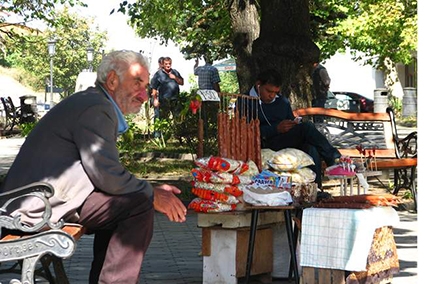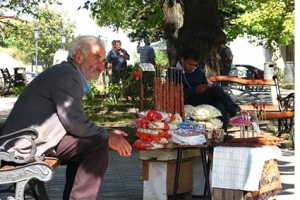The Autumn Sonnet
Autumn in Tbilisi and other big Georgian towns is distinguished by particular liveliness and activity: Tbilisoba and the other numerous festivals that take place in the capital around this time; Rtveli in Kartli and Kakheti, and plentiful festivals and events held in other large towns around Georgia. Together with these, political life wakes up after its summer holiday nap – the sessions are renewed in Parliament; government, oppositional parties and non-governmental organizations start working at full capacity; lessons kick off in schools, institutions of higher education and kindergartens; people return from their vacations and those with the privilege of having a job continue their work and take up their responsibilities; the streets of the capital begin to burst with the usual cars and the rush hour is continuous. In short, the sound and loath continues...
This, in our reality, is the most trivial, worn, and apart from a few exceptions, the most meaningless part describing this season of the year.
Yet another, not quite easy period begins in the lives of simple, ordinary people, full of harsh problems, and fear: fear of losing a job, increase of prices on products, increase of tax rates; fear of another governmental crisis which will heavily influence those same ordinary citizens; fear of somebody in the family becoming ill and lack of money that might be needed for their treatment. Meanwhile the winter is coming, the New Year, and a lot needs to be done in advance. In short, money needs to be earned.
The Georgian television channels broadcast boredom, though with changed-format and pavilion-decorations – offering ignorance, tastelessness and impudence; if you gather all Georgian channels together and make a spontaneous compilation of the sounds coming from them, you will hear the following: barking, cursing, crying and weeping with crocodile tears, hysterics, edification in well-fed-imperative voices, laughter and giggles, mumbling and stuttering. These are those voices which can be heard in autumn on Georgian television, or more precisely – heard by simple, ordinary citizens who at the same time are thinking about their future.
Autumn might also be a time for separation and meeting; a time when people find each other. Children in the parks and squares, their parents, lovers, or just people who wander in the falling leaves and gather yellow, red and oranges that can be found more rarely in autumn. It’s not that you won’t find them at all; surely, you will see all of them in the squares and parks of the city, but none of them will be wandering through the falling leaves.
Falling leaves are spread over the ground in autumn, the rest of the leaves fall gradually too, but these leaves are all by themselves, while children, parents, lovers and people are by themselves too...with their noses and heads deep in their cell phones, tablets and lap tops, being entangled like flies in the so called social networks, being checked-in, tagged and liked.
I, too, really love autumn. After all, I was born in the last month of autumn. That is why I love the month of November and late autumn. And the winter waiting just behind the door, pouring fog out of a soap-bubble maker instead of bubbles – as if preparing itself for its performance on stage.
I love thinking in autumn. I love going to my village. Early in the morning and during dawn each sound, object, movement gains a special philosophical expression. Watching the man walking down the country lane, until the fog swallows him. And the cow coming out of that same fog, pausing by its gate and calling for its owner.
Autumn would have been good everywhere – in the village and in the city, if it had only its poetic sadness and prosaic joy and nothing more.
For me, and probably for many other citizens of this country, this one and previous autumns have become extremely boring – with their “renewed” TV seasons, political temperature, prices, increased tariffs and the apocalyptic downfall of the national currency, reproached comments of high ranked officials about the issues essentially important to ordinary people; with the grumbling-snarling- barking-howling and the cynical demonstration of high intelligence coefficient of the grievous opposition– implying: ‘hey people, you poor things, so, you did not want the educated morons? Here, have morons again – but ignorant and stupid’; with the never-ending court trials of former high ranked governmental officials, which has turned into the Franz Kafkian absurd, and thoughts... of people, our thoughts. That it will soon be cold. The trees won’t have leaves any more. Cold winds and rains will start. The day will become shorter and the night longer. At night, we won’t hear the sounds of the crickets from the garden anymore. We will be wearing warm clothes and somewhere nearby, the winter will be waiting with its soap-bubble maker...
Entertaining such thoughts, I notice an elderly man. Sitting on the crosswalk parapet, he had neatly arranged the yellow, brown and blackish Churchkhelas on an open newspaper next to him; one part wrapped in cloth and the other left open but covered with cellophane to prevent the flies from sitting on it. He was obviously a clean old man. He had brought the Churchkhelas made by his wife and had arranged everything for sale exactly as she had instructed. Soon, the old man hurried to his village, and I to my home, because I had bought all the Churchkhelas from him. I saved the old man from waiting and tiredness, got some amazingly delicious delicacies and hurried to cheer up my boys. Try, at least sometimes, in the autumn, to listen to only the sounds of autumn, to see only autumn, and to taste only autumn.
Bacho Kvirtia












